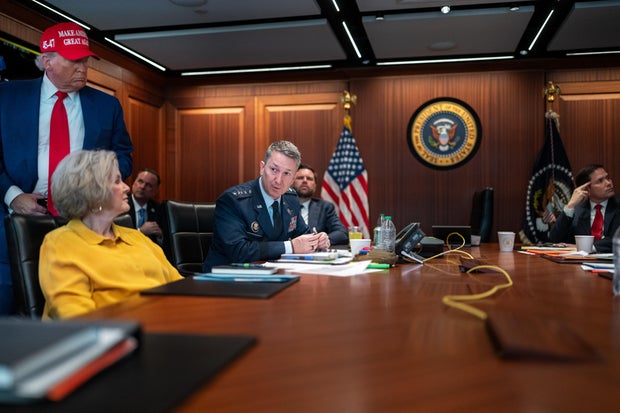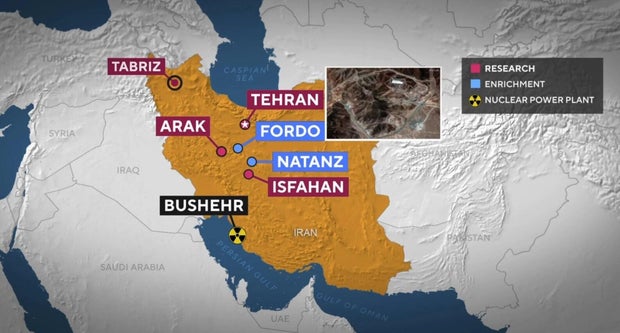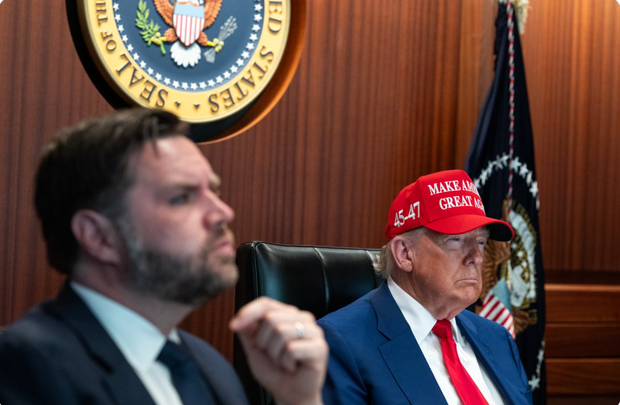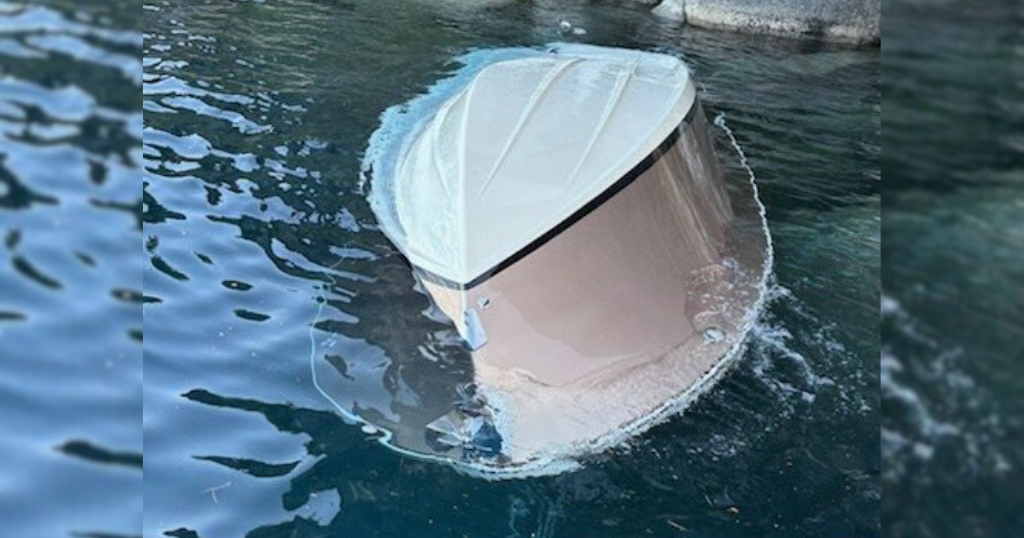U.S. launches strikes on 3 Iranian nuclear facilities, Trump says - CBS Pittsburgh
Washington — The United States launched strikes on three Iranian nuclear facilities, President Trump announced Saturday evening, calling them a "spectacular military success."
"The U.S. military carried out massive precision strikes on the three key nuclear assemblies in the Iranian regime: Fordo, Natanz and Esfahan," President Trump said in a national address from the White House Saturday night. "Our objective was the destruction of Iran's nuclear enrichment capacity and a stop to the nuclear threat posed by the world's number one state sponsor of terror."
Prior to his address, the president wrote on his Truth Social platform that a "full payload of BOMBS" was dropped on the "primary site" Fordo. The president also said all U.S. planes made it safely out of Iranian air space.
And in second post, Mr. Trump wrote: "This is an HISTORIC MOMENT FOR THE UNITED STATES OF AMERICA, ISTAEL (sic), AND THE WORLD. IRAN MUST NOW AGREE TO END THIS WAR. THANK YOU!"
The president addressed the nation regarding the strikes late Saturday night, saying that "Iran's key nuclear enrichment facilities have been completely and totally obliterated" and issuing a warning to Iran to strive for a peace deal in its war with Israel.

"There will be either peace, or there will be tragedy for Iran far greater than we have witnessed over the last eight days," Mr. Trump said while flanked by Vice President JD Vance, Secretary of State Marco Rubio and Defense Secretary Pete Hegseth. "Remember, there are many targets left."
Mr. Trump added that "if peace does not come quickly, we will go after those other targets with precision, speed and skill. Most of them can be taken out in a matter of minutes."
Iran has pledged to retaliate if the U.S. joined the Israeli assault, which began with airstrikes on Iranian nuclear sites and military targets on June 13. Iran has responded with missile and drone attacks on Israeli cities.
But in a follow-up social media post following his national address, Mr. Trump said that "ANY RETALIATION BY IRAN AGAINST THE UNITED STATES OF AMERICA WILL BE MET WITH FORCE FAR GREATER THAN WHAT WAS WITNESSED TONIGHT."
Two senior Defense Department officials confirmed to CBS News that three American B-2 bombers were used to strike Fordo early Sunday local time, with each of those B-2s armed with 2 U.S.-produced "bunker-buster" bombs known as the GBU-57 Massive Ordnance Penetrators, or MOPs — bombs so heavy that they could only be dropped by a B-2.

Fordo, the site of a high-grade uranium enrichment facility that international experts believe is key to Iran's nuclear program, is buried almost 300 feet beneath a mountain and protected by significant air defenses. The MOP is believed to be the best chance at destroying the Fordo facility.
The officials told CBS News Natanz and Isfahan were struck by tomahawk missiles launched by submarines. It's unclear how many missiles were launched at those two sites.
The U.S. reached out to Iran diplomatically Saturday to say the strikes are all the U.S. plans and that regime change efforts are not planned, the sources said. Earlier this week, multiple U.S. officials told CBS News that Mr. Trump opposed an Israeli plan to kill Ayatollah Ali Khamenei, Iran's supreme leader.
Not all U.S. allies in the region who house U.S. troops that are part of U.S. Central Command were informed in advance of the coming U.S. plan to strike in Iran, according to diplomatic sources. Some of the allies were informed as the planes were in the air.
The United Nation's International Atomic Energy Agency stated in a social media post that it confirm "no increase in off-site radiation levels" in the wake of the U.S. strikes.
The U.S. alerted Israel ahead of the strikes, two White House officials told CBS News. Mr. Trump and Israeli Prime Minister Benjamin Netanyahu spoke following the strikes, the officials said. And in a video address, Netanyahu praised the president for conducting the strikes.
"President Trump and I often say peace through strength. First comes strength, then comes peace. And tonight President Trump and the United States acted with a lot of strength."
According to the Iranian state media outlet IRNA, Morteza Heidari, a spokesman for crisis headquarters in Iran's Qom province, acknowledged there had been attacks on all three nuclear sites. Iran's Atomic Energy Organization also confirmed the attacks in a statement, but claimed the strikes will not stop it from progressing in its nuclear program. It also called on the international community to condemn the attacks.
And in a social media post Sunday morning, Iranian Foreign Minister Abbas Araghchi said that "in accordance with" the United Nations Charter "and its provisions Iran reserves all options to defend its sovereignty, interest, and people."
Araghchi alleged that the U.S. in its attack had "committed a grave violation of the UN Charter."
Homeland Security officials are monitoring for potential physical and cyber reprisals from the U.S. attack, domestically amid a "very high" threat level and with the "red line" of the Iranian response doctrine now crossed, CBS News has learned.
"We're in unchartered territory," one U.S. intelligence official told CBS News, while speaking about potential Iranian threats to the U.S. homeland. "We don't know how Iran will react to this because this is the highest rate of tension and conflict we've had in recent history. We're just not sure how the Khomeini regime will react."
The official added that assessments range from little to no action on the part of Iranians to desperate and drastic action.
House Speaker Mike Johnson was briefed ahead of the strikes, according to a source familiar.
The response from U.S. lawmakers has been mixed. Some Republicans, including Johnson, expressed support for the strikes, while others, like Rep. Marjorie Taylor Greene of Georgia, an ardent Trump supporter, posted on X that "this is not our fight."
Both Democratic House Minority Leader Hakeem Jeffries and Senate Minority Leader Chuck Schumer criticized the president for not seeking congressional authorization for the strikes.
"President Trump misled the country about his intentions, failed to seek congressional authorization for the use of military force and risks American entanglement in a potentially disastrous war in the Middle East," Jeffries said.
Democratic Sen. Mark Warner of Virginia, vice chair of the Senate Select Committee on Intelligence, said in a statement that Mr. Trump campaigned on a promise to "'end the endless foreign wars.'"
"Tonight, he took steps that could drag the United States into another one, without consulting Congress, without a clear strategy, without regard to the consistent conclusions of the intelligence community, and without explaining to the American people what's at stake," Warner said.
Earlier Saturday, multiple U.S. officials had confirmed to CBS News that B-2 bombers had departed Whiteman Air Force Base in Missouri en route to Guam. Multiple U.S. aerial refueling tankers were spotted on commercial flight trackers flying flight patterns consistent with escorting aircraft from the central U.S. to the Pacific.
The U.S. strikes come after Araghchi met with European officials in Geneva Friday and said he was open to further dialogue.
"Iran is ready to consider diplomacy once again," Araghchi said, adding, "I stress that Iran's defense capabilities are not negotiable. (But) I express our readiness to meet again in the near future."
On Thursday, the president said he would decide whether to strike Iran "within the next two weeks." One source told CBS News at the time that Mr. Trump "believes there's not much choice. Finishing the job means destroying Fordo."
U.S. Ambassador to Israel Mike Huckabee said earlier Saturday that the U.S. had begun evacuating Americans and green card holders out of Israel aboard assisted departure flights. Two flights departed from Tel Aviv to Athens with approximately 70 U.S. citizens, their accompanying immediate family members and lawful permanent residents, the State Department said prior to Mr. Trump's announcement of the strikes.

Meanwhile, the White House released photos of the Situation Room during the strikes. In the room with the president were Vance, Hegseth, Rubio, chairman of the Joint Chiefs Dan Caine, CIA Director John Ratcliffe, Director of National Intelligence Tulsi Gabbard, Middle East special envoy Steve Witkoff, White House chief of staff Susie Wiles, deputy chief of staff Dan Scavino, deputy national security adviser Andy Baker, White House general counsel David Warrington and White House press secretary Karoline Leavitt.
Gabbard's presence in the room was significant, as on Friday, Mr. Trump told reporters that she was "wrong" when she testified to Congress in March that Iran wasn't building a nuclear weapon.
Hegseth and Caine were scheduled to hold a news briefing from the Pentagon at 8 a.m. Eastern Time Sunday to provide an update on the assault.
, Aaron Navarro, Margaret Brennan, James LaPorta and Jennifer Jacobs contributed to this report.









